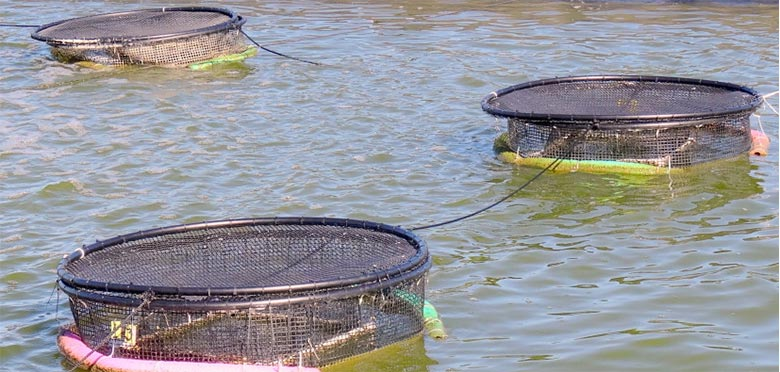Cage Culture in Aquaculture | 29 Jan 2022
For Prelims: Cage Culture in Aquaculture, Initiatives in the FIsheries Sector.
For Mains: Significance of Cage culture in Aquaculture and Challenges, Blue Revolution.
Why in News
The Ministry of Fisheries, Animal Husbandry and Dairying organised a webinar on “Cage aquaculture in Reservoir: Sleeping Giants” as a part of “Azadi Ka Amrit Mahotsav”.
- Department of Fisheries, GOI earmarked the investment targets for promoting cage aquaculture under flagship scheme Pradhan Mantri Matsya Sampada Yojana (PMMSY).
Key Points
- About:

- Cage aquaculture involves the growing of fishes in existing water resources while being enclosed in a net cage which allows free flow of water.
- It is an aquaculture production system made of a floating frame, net materials and mooring system (with rope, buoy, anchor etc.) with a round or square shaped floating net to hold and culture large numbers of fishes and can be installed in reservoir, river, lake or sea.
- Cage farms are positioned in such a way to utilize natural currents, which provide the fish with oxygen and other appropriate natural conditions.
- Factors Causing Cage Culture:
- Factors such as increasing consumption of fish, declining stocks of wild fishes and poor farm economy have increased interest in fish production in cages.
- Many small or limited resource farmers are looking for alternatives to traditional agricultural crops.
- In view of the high production attainable in the cage culture system, it can play a significant role in increasing the overall fish production in India.
- Significance:
- Removes Constraints of fish farming on land:
- Farming of fish in an existing water body removes one of the biggest constraints of fish farming on land, ie., the need for a constant flow of clean, oxygenated water.
- Least Carbon Emission:
- Cage culture is a low impact farming practice with high returns and least carbon emission activity.
- Expanding Opportunities:
- Aquaculture appears to be a rapidly expanding industry and it offers opportunities even on a small scale.
- Better Utilization of India’s long Coastline:
- Suitable locations in India's long coastline, vast brackish water areas available in coastal states and other underutilized water bodies can be better utilized by adopting cage culture.
- Offers alternative income Source:
- Since the investment is low and requires very little / no land area, this farming method is ideal for small-scale fisherfolks as an alternative income source.
- This can be taken up as a household / women activity since labour involved is minimal and can be managed by a small family.
- The design of the cage and its accessories can be tailor-made in accordance to the individual farmer’s requirements.
- Removes Constraints of fish farming on land:
- Challenges:
- Feed to the caged fish must be nutritionally complete and kept fresh.
- Low Dissolved Oxygen Syndrome (LODOS) is an ever present problem and may require mechanical aeration.
- Fouling of the net cage.
- Vandalism or poaching is a potential problem.
- Navigation issues.
- Accumulation of unused feed and excreta will lead to water pollution as well as eutrophication.
- Change in water quality parameters.
- Conflicts within the local community.
- Predation by aquatic mammals and birds.
- Escapement.
- Overcrowding of aquatic organisms in cages.
Initiatives related to Fisheries
Way Forward
- There is a need to have a robust cage culture system in reservoirs including potential markets to ensure good returns to the farmers.
- Need for the scientists and the Fisheries Departments of the States/ UTs to motivate fish farmers and develop innovative ways as well as policies for increasing profits, decreasing input cost, species diversification and increasing the production and productivity of cage culture systems in the reservoirs.
- There is a need for promotion of cage aquaculture in reservoirs of the country by following good management practises and providing support services.
